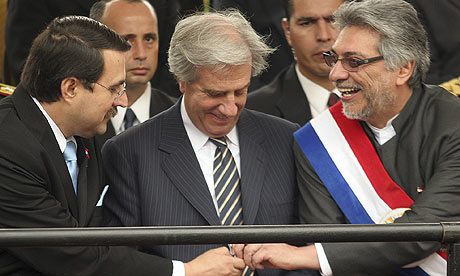
(above) Uruguay's Tabare Vazquez, centre, pictured with Paraguay's president and vice-president, said his government 'does not discriminate'. Photograph: Reuters
Uruguay and Peru diverge on gay rights
• Uruguay lifts ban on gay recruits to armed forces
• Peru threatens homosexual police who cause 'scandals'
May 15, 2009 - Guardian.co.uk
Rory Carroll, Latin America correspondent
Uruguay has lifted a ban on gay people in the armed forces while Peru has threatened to fire gay police officers who cause "scandals", exposing a wide gulf in South American attitudes towards homosexuality.
The Uruguayan president, Tabare Vazquez, scrapped a law from the 1973-85 dictatorship that barred gay people from military academies, cementing his country's reputation as one of the most progressive in the region.
"The Uruguayan government does not discriminate against citizens based on their political, ethnic or sexual identity," Vazquez said.
The defence minister, Jose Bayardi, signed the decree this week. The ban had categorised homosexuality among the "mental illnesses and disorders" that rendered military recruits unsuitable to serve.
Some retired military officers warned that the liberalisation would undermine morale and discipline, but protest was otherwise muted. Two years ago, Uruguay's centre-left government set a regional milestone by legalising civil unions for gay couples, granting rights over inheritance, pensions and child custody.
Latin America, long a redoubt of conservative Catholicism, homophobia and machismo, has mellowed in recent years. Colombia and Mexico City moved to grant more rights to gay couples, Buenos Aires opened a flagship gay hotel and Paraguay signalled it too would allow gay people in the military.
Cuba, which used to jail people for homosexuality, now tolerates same-sex couples holding hands in the street. The daughter of the president, Raul Castro, is the island's leading advocate of rights for gay men, lesbians and transsexuals.
The belief that homosexuality is a perversion remains deeply rooted, however, and there are few openly gay politicians, business leaders or celebrities in the region.
Before gay rights advocates could celebrate Uruguay's decision, Peru, on the other side of South America, announced it would fire police officers who "damaged the image" of the police force.
The centre-right government said the new law, part of a wider crackdown on officers who take bribes or abuse suspects, would mend the force's tattered reputation.
The supreme court overturned a ban on gay people in the police and military in 2004. The new law tries to skirt that ruling by threatening to fire gay officers who "cause a scandal or damage the image of the institution".
"The only thing that is penalised now are the scandals that can be caused by a scandalous relationship, if they are homosexuals," an interior ministry spokesman said.
By contrast, heterosexuals who cause a scandal by adultery face only suspension. Jorge Chavez, president of the Lima Homosexual Movement, said the law appeared to violate constitutional guarantees. "Heterosexuality isn't scandalous but homosexuality is? It's discriminatory," he told the Associated Press.